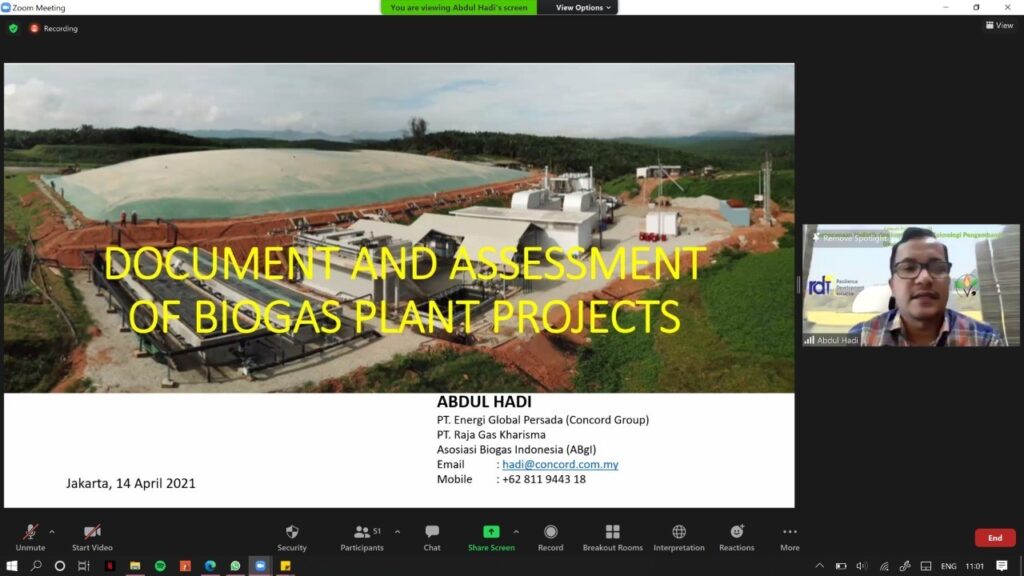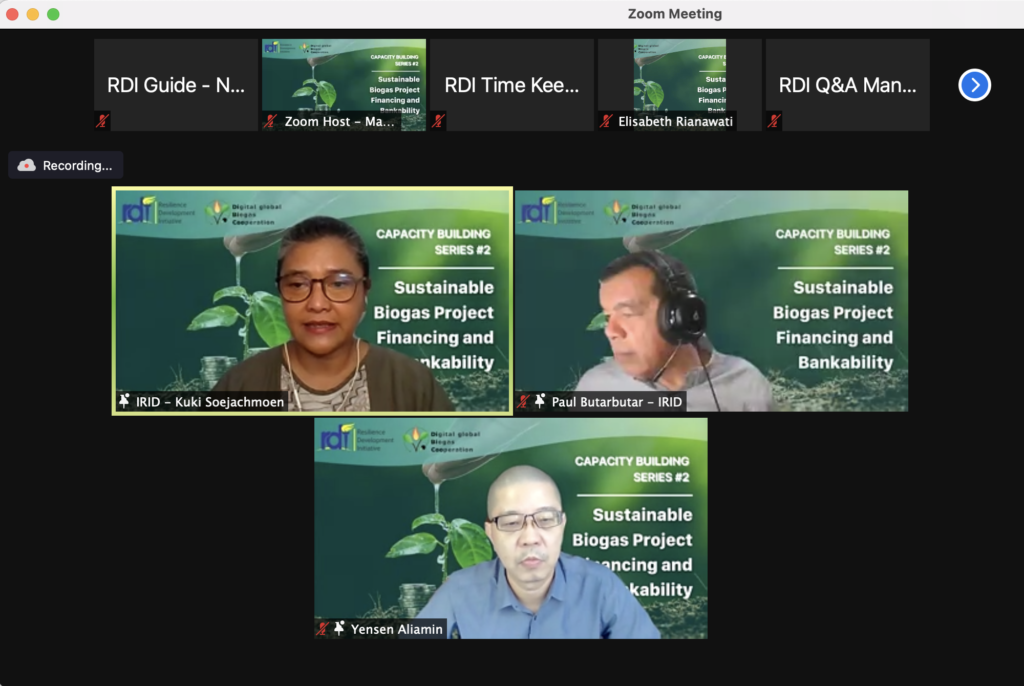Besides its fast extension in recent years, biogas technology development holds various challenges and its successful implementation depends not just on the installation of a suitable system but also on operation and maintenance of that system as well as the appropriate framework conditions including policy and financing scheme to make it a viable and economic alternative. Therefore, the Resilience Development Initiative (RDI) organized two series Capacity Building. This training aimed to deepen the knowledge and improve the skills of all of the local stakeholders in biogas industries with topics related to the basics plan of biogas project identify and risk mitigation, technology, biogas utilization, business model, and financing sources for biogas projects. Participants knowledge and capacity improvement in these activities were measured by pre and post-test for each session.
DiBiCoo Capacity Building series#1 entitled Holistic Planning and Implementation of Biogas Development Technology in Indonesia on 14 and 15 April 2021 virtually via Zoom Platform. The first day of this training (14/04) invited a few speakers such as Hari Yuwono as a Coordinator Indonesia Private Financing Advisory Network (PFAN), Yaseen Saile from GreenCape South Africa, and Abdul Hadi from PT Raja Gas Kharisma on the first session of the day. The second day (15/04) also invited experts from chemical engineering at the Bandung Institute of Technology, Prof. Ir. Tjandra Setiadi, M.Eng., Ph.D., Anggit Raksajati, ST., Ph.D., and Ir. Sanggono Adisasmito, Ph.D. to share about biogas upgrading product and its digestate utilisation. If not properly sanitized, digestate may still contain a high amount of pathogens. However, there are several challenges in the utilization of digestate, such as lack of regulations and clear SOPs regarding the proper utilization of digestate and its advantages. In addition‚ if we could improve the quality of biogas by reducing the CO2‚ content, biogas could be utilized as substitution of natural gas, fuels, etc. As for biogas conversion to bio-CNG for the transportation fuel, transmission pipes and jargas must be utilized while bio-CNG filling stations must be well developed. In the meantime, government regulations must be reinforced to improve the consumption of bio-CNG in Indonesia.

There are a lot of factors affecting the success rate of industrial scale biogas installation, whether it is technical, non-technical, strategic, or operational issues such as determination of feedstocks, business aspects, marketing, pricing, production capacity, design, investment calculation, and risk analysis. Bankability does not ensure project implementation success. Detailed consideration is needed to assess all risks and improve implementation success.‚ Therefore, the DiBiCoo Capacity Building Series #2 with the topic of “Sustainable Biogas Project Financing and Bankability”, was held on July 14-15th 2021 via Zoom Platform and opened by Trois Dilisusendi, representative of Directorate of Bioenergy, Ministry of Energy and Mineral Resources Indonesia.
The first day (14/07) of this session focused on measuring the estimation cost of the biogas project by Satria Wira Tenaya from GGGI Indonesia and the risks assessment and management of biogas project from bank institution perspective by Elis Mudjiwati from Indonesian Banking Development Institution (LPPI). Not only training sessions, the second capacity building also invited Agunan Samosir from Fiscal‚ Policy Agency Ministry of Finance and Pradana Murti from PT SMI to share shortly about biogas financing from public sectors and private sectors respectively. The second day (15/07) was no less interesting. Scaling up blended finance scheme in financing biogas project were presented by Bangkit Oetomo from Tropical Landscape Finance Facility (TLFF) and emission trading system (ETS) opportunity in biogas project was also well delivered by Moekti H Soejachmoen featuring Paul Butarbutar from Indonesia Research Institute for Decarbonization (IRID). Lastly, to bring Indonesia’s sustainable financing journey, Istiana Maftuchah, senior analyst of sustainable financing, represented the Financial Services Authority (OJK) roles in financing renewable energy projects including biogas.
Due to limitations precipitated by the COVID-19 pandemic, DiBiCoo activities in 2021 still have been successfully conducted virtually. Despite conducted virtually, these workshops and capacity building series activities are still concretely establishing DiBiCoo’s presence in scaling up the biogas market in Indonesia and providing a forum in which local stakeholders have informed the importance of biogas and its related aspects e.g., feedstock, current governmental policies, financing, biogas uptake, etc. The stakeholders have become more diverse and the exposure is also wider as is the ease of access to DiBiCoo programs through digital technology

